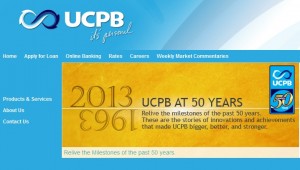Gov’t set to bid out stake in UCPB
The government is preparing to auction off its controlling stake in United Coconut Planters Bank to allow the bank to structure its recapitalization program and chart its future growth.
UCPB chair Menardo Jimenez confirmed that the bank had mandated Standard Chartered to look at the feasibility of privatizing government-sequestered shares in UCPB.
Once ready for the auction, Standard Chartered will then draw up the term sheet to invite potential strategic investors.
“We have mandated to dispose (the sequestered shares) under a bidding process. Standard Chartered is now doing the study,” Jimenez told the Inquirer on the sidelines of the annual reception for the banking community hosted by Bangko Sentral Governor Amando Tetangco Jr. Friday night.
Asked if the bidding would be held within the year, Jimenez said this would depend on “the result of the findings of Standard Chartered.”
“We want it,” Jimenez said, referring to the sale.
He said UCPB was like an orphan.
“Mahirap walang tatay at nanay (It’s difficult not to have a father and mother),” he explained.
UCPB last year obtained the approval of shareholders to beef up its authorized capital to P40 billion. This will give the bank the leeway to double its capital in line with the Basel 3 capital adequacy ratio framework implemented this year. Based on its financial statement, UCPB’s stockholders equity stood at P20.4 billion as of June 2013.
With the increase in capital, which will be incorporated in the prospective bidding guidelines, the new investor will have to put up the necessary amount, Jimenez said.
Asked how much stake in UCPB will be privatized, Jimenez said it would be the entire government’s stake—currently held by the Presidential Commission on Good Government.
“We will bid out as soon as everything is in order,” he said.
The Supreme Court ruled with finality last year that the government owns the shares claimed by businessman Eduardo “Danding” Cojuangco Jr. in UCPB and that these should be used for the benefit of coconut farmers.
According to industry sources, several banks are already looking at UCPB ahead of the prospective privatization through a public bidding.
A top banker who used to be employed by UCPB said his new bank would be interested in UCPB because “it has a very good franchise, good deposit base and good customer service feature.”
But a key hurdle to the privatization of sequestered shares would be pricing, another banker said. Government financial institutions like the Philippine Deposit Insurance Corp., which infused additional liquidity to UCPB several years ago, do not have the flexibility to book losses under the auditing rules for state-run corporations. As a result, the banker said, the bank shares may be priced expensively.
UCPB’s recapitalization program is backed by the Department of Finance, the Bureau of Treasury, the PDIC, and the Presidential Commission on Good Government (PCGG).
The bank said the recapitalization program would ensure the bank’s longer term competitiveness, viability and growth; allow UCPB’s compliance with BSP regulatory requirements defined under the Basel 3 framework; and allow the bank to retire some of its government obligations.
Basel 3 capital adequacy ratio framework introduces a complex package of reforms designed to improve the ability of banks to absorb losses, extend the coverage of financial risks, and require stronger firewalls to withstand periods of stress.
Established in 1963, UCPB was the first private Philippine bank to become a universal bank. It obtained its expanded commercial banking license in 1981. As of end June 2013, UCPB had a loan portfolio of P72.5 billion while deposit liabilities amounted to P186 billion.

